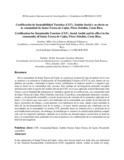| dc.contributor.author | Madrigal Villanueva, Erick | |
| dc.contributor.author | Gamboa Martínez, Alexander | |
| dc.date.accessioned | 2020-01-06T20:20:48Z | |
| dc.date.available | 2020-01-06T20:20:48Z | |
| dc.date.issued | 2019-12 | |
| dc.identifier.uri | http://hdl.handle.net/11056/17171 | |
| dc.description.abstract | En la comunidad de Santa Teresa de Cajón, se construyó un hotel de lujo de primer nivel, este se sometió a la normativa Certificación de Sostenibilidad Turística (CST) la cual, dentro de sus ámbitos de estudio, contempla el aporte social, refiriéndose al impacto positivo o negativo que tiene el hotel en la comunidad más cercana. Este trabajo de investigación pretende recopilar información sobre el aporte del Ámbito Social del CST, en el caso aplicado al hotel Hacienda Alta Gracia, con la finalidad de interpretar el verdadero aporte de la certificación, a la comunidad rural de Santa Teresa de Cajón, Pérez Zeledón, San José, Costa Rica, contemplando elementos sociales, rurales, y de desarrollo sostenible, a través de procesos de consulta de la normativa aplicada en el hotel, y los efectos que esta causó a los habitantes de la comunidad, por medio de recolección de datos, recorridos de trabajo, y acercamiento a los habitantes de la zona, dando como resultado la falta de un involucramiento real de la norma, y el poco interés genuino por colaborar con las necesidades de la comunidad. La norma CST, pretende hacer un control activo y profundo de la actividad turística del país, sin embargo, la entidad que se somete a la certificación prefiere cumplir solo con los requisitos mínimos, dejando en el olvido ese deseado aporte social entre el hotel de lujo y la comunidad rural, pudiendo así crear resistencia a la colaboración de la comunidad con un hotel de tal magnitud. | es_ES |
| dc.description.abstract | In the community of Santa Teresa de Cajón, a first class luxury hotel was built, which underwent the Certification of Sustainable Tourism (CST) regulation, which, within its areas of study, contemplates the social contribution, referring to the positive or negative impact that the hotel has on the nearby community. This research work aims to gather information on the contribution of the Social Scope of the CST, in the case applied to the Hacienda Alta Gracia hotel, in order to interpret the real contribution of the certification to the rural community of Santa Teresa de Cajón, Pérez Zeledón, San José, Costa Rica, contemplating social, rural, and sustainable development elements, through processes of consultation of the regulations applied in the hotel, and the effects that this caused to the inhabitants of the community, through data collection, work tours, and approach to the inhabitants of the area, resulting in the lack of a real involvement of the standard, and little genuine interest in collaborating with the needs of the community. However, the entity that undergoes certification prefers to comply only with the minimum requirements, leaving in oblivion the desired social contribution between the luxury hotel and the rural community, thus creating resistance to the collaboration of the community with a hotel of such magnitude. | |
| dc.description.sponsorship | Universidad Nacional, Costa Rica | |
| dc.language.iso | es | es_ES |
| dc.publisher | III Encuentro Internacional de Investigadores y Estudiantes de REOALCeI 2019 | es_ES |
| dc.subject | ASPECTOS SOCIALES | |
| dc.subject | DESARROLLO SOSTENIBLE | |
| dc.subject | PÉREZ ZELEDÓN (SAN JOSÉ) | |
| dc.subject | COMUNIDADES RURALES | |
| dc.subject | SOCIAL ASPECTS | |
| dc.subject | SUSTAINABLE DEVELOPMENT | |
| dc.subject | RURAL COMMUNITIES | |
| dc.subject | SEDE REGIONAL BRUNCA (UNIVERSIDAD NACIONAL (COSTA RICA)) | |
| dc.title | Certificación de sostenibilidad turística (CST), Ámbito social y su efecto en la comunidad de Santa Teresa de Cajón, Pérez Zeledón, Costa Rica. | es_ES |
| dc.title.alternative | Certification for Sustainable Tourism (CST), Social Ambit and its effect in the
community of Santa Teresa de Cajón, Pérez Zeledón, Costa Rica | |
| dc.type | http://purl.org/coar/resource_type/c_5794 | es_ES |

